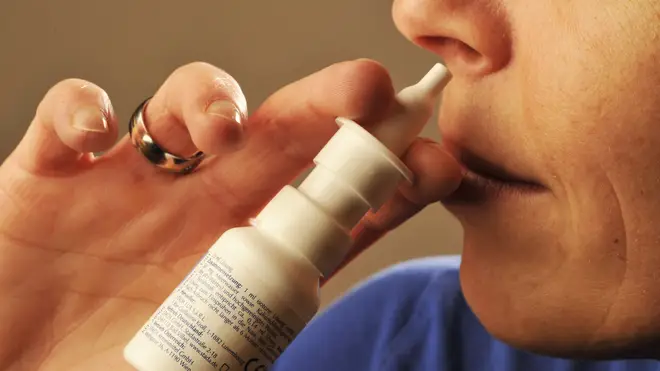
Nick Abbot 10pm - 1am
25 March 2021, 22:12

Scientists are to look into the effectiveness of the Oxford-AstraZeneca vaccine when delivered using a nasal spray.
The University of Oxford will examine the level of immune system responses generated by the vaccine using this delivery technique, as well as monitoring safety and for any adverse reactions.
Thirty healthy Oxford-based volunteers aged 18-40 will receive the vaccine through an intranasal spray device, similar to many over-the-counter hay fever nasal sprays.
The Oxford-AstraZeneca jab is currently being delivered by intramuscular injection as part of the national rollout.
Dr Sandy Douglas, who is leading the study, said: "Some immunologists believe that delivering the vaccine to the site of infection may achieve enhanced protection, especially against transmission, and mild disease.
"We hope this small safety-focused study will lay the foundation for future larger studies that are needed to test whether giving the vaccine this way does protect against coronavirus infection."
READ MORE: Covid lockdown laws extended for another six months despite major Tory revolt
READ MORE: Tory rebels condemn lockdown law extension that risks 'normalising extreme policy'

Daniel Barnett explains legal point of view of vaccines
Dr Douglas added: "There are a variety of people who will find an intranasal delivery system more appealing, which may mean vaccine uptake is higher in those groups.
"It might also have practical advantages - nasal sprays have been used successfully for other vaccines, for example the flu vaccine used in UK schools."
Dr Meera Madhavan, lead clinical research fellow at the Jenner Institute, said: "This study will help us to understand the safety of, and side-effects associated with, giving the Oxford/ AstraZeneca Covid-19 vaccine by nasal spray.
"It is an important first step towards increasing our range of options for curtailing the spread and impact of COVID-19 globally."
Professor Adrian Hill, director of the Jenner Institute, said the results could how effective the vaccine is in preventing disease episodes and asymptomatic infections, possibly helping to reduce transmission.

Vaccine passports to travel abroad are 'inevitable', says professor
Boris Johnson made the suggestion on Wednesday while being grilled by MPs on the Commons Liaison Committee, much to the dismay of pub workers and trade bodies.
Speaking on Thursday, the Prime Minister said the review into coronavirus health certificates is expected by April 12, although it may not be possible to roll them out until everyone has been offered a jab.
The Prime Minister told broadcasters: "I do think there is going to be a role for certification.
"What we said is we'll be reporting on the work of the certification group in early April, either on April 5 or April 12.
"There are lots of difficult issues because there are some people who for medical reasons can't get a vaccination, pregnant women can't get a vaccination at the moment, you've got to be careful about how you do this.
"You might only be able to implement a thorough-going vaccination passport scheme even if you wanted such a thing in the context of when absolutely everybody had been offered a vaccine."